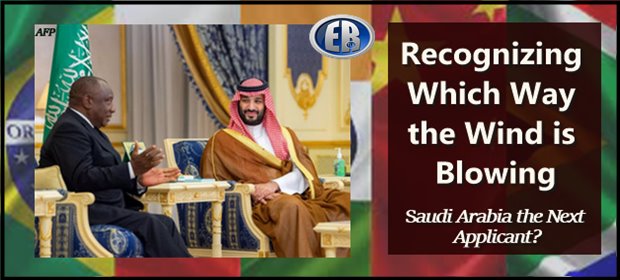
Saudi Arabia reportedly the latest country to be interested in joining BRICS
AHMED ADEL
South African President Cyril Ramaphosa stated, following his recent two-day visit to Saudi Arabia, that the oil-rich desert kingdom wants to join BRICS, a large geopolitical bloc comprising of Brazil, Russia, India, China and South Africa. Riyadh’s reported intentions signals a dramatic potential expansion of the bloc amid growing tensions with the US over the Russia-Ukraine crisis.
“The BRICS nations are going to be meeting in a summit next year under the chairship of South Africa, and the matter is going to be under consideration,” Ramaphosa said. “And already, a number of countries or nations have been making approaches to the other member countries, and we’ve given them the same answer – to say it’ll be discussed by the BRICS partners themselves, five of them, and thereafter a decision will be made.”
The South African President added: “They (Saudi Arabia) are not the only country [seeking membership in BRICS],” a reference to Egypt, Iran and Argentina.
Saudi Arabia joining BRICS would be significant for the bloc as it is one of the most influential Arab and Muslim countries in the world. It also signifies the Arab World’s move away from Washington, with Saudi Arabia particularly being one of the most pro-US countries in previous decades. This demonstrates that the attractiveness of BRICS has grown significantly in recent years, even in face of the West’s attempts to isolate Russia because of its military operation in Ukraine.
The relationship between Riyadh and Washington was based on the US being supplied with cheap oil in exchange for Saudi Arabia’s security. However, Washington has proven to be an unreliable partner, and Saudi Arabia can now more easily find alternative providers of security systems, including from BRICS members Russia, India and China.
At the moment, relations between Riyadh and Washington are arguably in a crisis. The Americans are angry that Saudi Arabia and OPEC decided to reduce oil production by two million barrels per day as it leads to higher fuel prices and increased inflation in the US. This is something the Biden administration is desperately trying to avoid right before the November congressional elections.
Just as important, it also weakens Western sanctions on Russia. The expected rise in oil prices, as a result of OPEC’s decision, could bring Russia more money than it loses from the EU’s sanctions.
It is for this reason that Washington accuses Riyadh of “fuel[ing] Putin’s war machine” and why President Joe Biden interprets Saudi Arabia’s decision to cut oil production as an insult and is thus threatening consequences. Washington is reconsidering its alliance with Riyadh, and as one of the punitive measures, military aid to Saudi Arabia could be halted or reduced.
Saudi Arabia tried to downplay the importance of its decision and justified it as an action intended to protect its own economic interests. The US, which usually demands other countries conform to its liberal world view, has ignored Saudi Arabia’s breach of human rights against minorities, women, and political opposition for decades. It is likely that Washington will begin a campaign of demonising and pressuring Saudi Arabia for its lack of democracy and human rights.
Differences between the US and Saudi Arabia have been noticeable for a long time. After Iran’s attacks on Saudi oil facilities, Riyadh felt abandoned by the US. The Americans, for their part, were enraged by the 2018 killing of regime critic Jamal Khashoggi at the Saudi consulate in Istanbul, in which Crown Prince Mohammed bin Salman allegedly played a role.
The Saudis have for a long time failed to get the weapons they wanted from the US, such as long-range offensive drones. If the Saudis make a turn towards Russia and China, it is to be expected that Washington’s punitive measures will also follow.
Biden does not have the strength to fulfil the wishes expressed by the representatives of the Democratic Party, who are demanding that the delivery of American weapons to Saudi Arabia be suspended. The US president postponed the issue until the November elections. From the president’s view, perhaps it is better to delay the issue as it could lead to Riyadh’s complete turn towards Russia and China.
None-the-less, Saudi Arabia’s state-owned oil company Aramco finalised a deal in March to build a major refinery in China, and then in the same month it was also announced that the Arab country was considering pricing oil deals with China in yuan rather than the US dollar. With the announcement made by Ramaphosa, all signs highlight that Saudi Arabia recognises the world order and system is changing, and for this reason it is boosting its relations with China and BRICS despite pressure and threats from Washington.
Source
Background image: https://www.silkroadbriefing.com/news/2019/08/06/brics-bank-move-away-us-dollar-loans/

••••
The Liberty Beacon Project is now expanding at a near exponential rate, and for this we are grateful and excited! But we must also be practical. For 7 years we have not asked for any donations, and have built this project with our own funds as we grew. We are now experiencing ever increasing growing pains due to the large number of websites and projects we represent. So we have just installed donation buttons on our websites and ask that you consider this when you visit them. Nothing is too small. We thank you for all your support and your considerations … (TLB)
••••
Comment Policy: As a privately owned web site, we reserve the right to remove comments that contain spam, advertising, vulgarity, threats of violence, racism, or personal/abusive attacks on other users. This also applies to trolling, the use of more than one alias, or just intentional mischief. Enforcement of this policy is at the discretion of this websites administrators. Repeat offenders may be blocked or permanently banned without prior warning.
••••
Disclaimer: TLB websites contain copyrighted material the use of which has not always been specifically authorized by the copyright owner. We are making such material available to our readers under the provisions of “fair use” in an effort to advance a better understanding of political, health, economic and social issues. The material on this site is distributed without profit to those who have expressed a prior interest in receiving it for research and educational purposes. If you wish to use copyrighted material for purposes other than “fair use” you must request permission from the copyright owner.
••••
Disclaimer: The information and opinions shared are for informational purposes only including, but not limited to, text, graphics, images and other material are not intended as medical advice or instruction. Nothing mentioned is intended to be a substitute for professional medical advice, diagnosis or treatment.





Leave a Reply